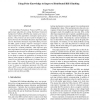660 search results - page 113 / 132 » Hybrid CSP Solving |
FUZZIEEE
2007
IEEE
14 years 4 months ago
2007
IEEE
— DNA sequence basecalling is commonly regarded as a solved problem, despite significant error rates being reflected in inaccuracies in databases and genome annotations. This has...
GECCO
2007
Springer
14 years 4 months ago
2007
Springer
This paper introduces the concept of a critical backbone as a minimal set of variables or part of the solution necessary to be within the basin of attraction of the global optimum...
GECCO
2007
Springer
14 years 4 months ago
2007
Springer
A novel optimisation accelerator deploying neural network predictions and objective space direct manipulation strategies is presented. The concept of directing the search through ...
WABI
2007
Springer
14 years 4 months ago
2007
Springer
Graph-theoretic models have come to the forefront as some of the most powerful and practical methods for sequence assembly. Simultaneously, the computational hardness of the underl...
IAT
2006
IEEE
14 years 4 months ago
2006
IEEE
The Distributed Probabilistic Protocol (DPP) is a new, approximate algorithm for solving Distributed Constraint Satisfaction Problems (DCSPs) that exploits prior knowledge to impr...


